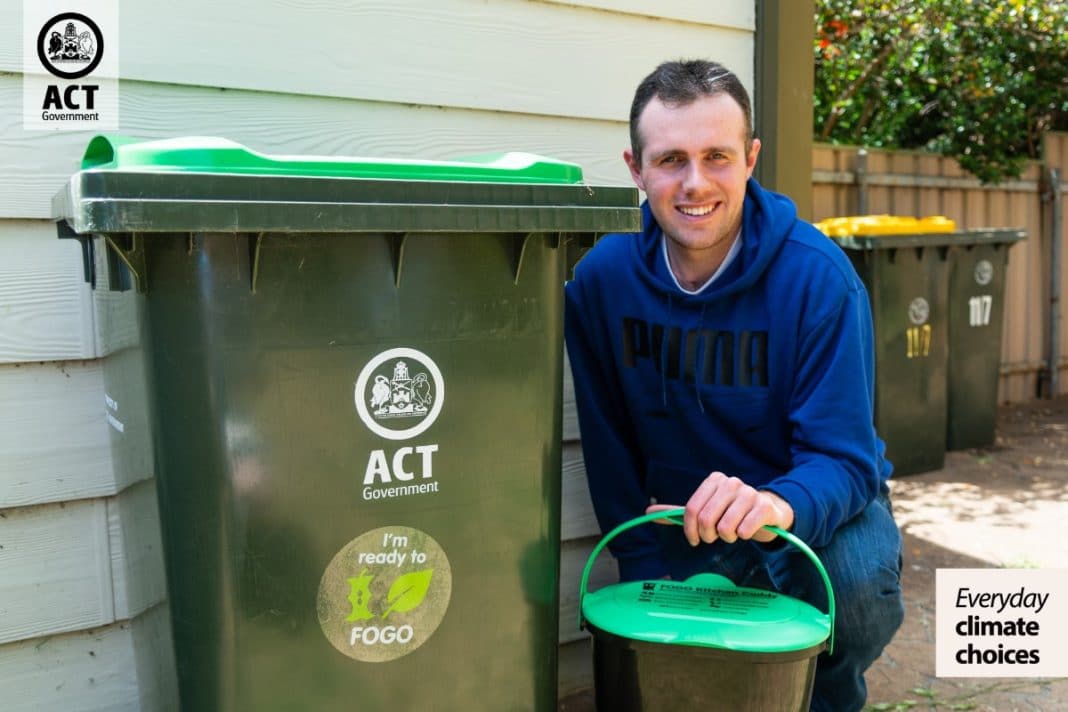New household waste collection services will start in some Belconnen suburbs in two weeks, on Monday 22 November. Residents have already started receiving their Food Organics and Garden Organics (FOGO) welcome packs and kitchen caddies.
Last month, the ACT Government announced that a $4 million pilot of FOGO waste recycling collection services – a Labor election commitment – would start in the Belconnen Town Centre, Bruce, Macquarie, and Cook.
By turning household scraps into compost, the scheme aims to reduce waste going to landfill and lower waste emissions by up to 30 per cent, said Chris Steel, ACT Minister for Transport and City Services.
“The FOGO service will help Canberrans to take everyday action on climate change by removing organics from local landfill and turning household garbage into nutrient-rich compost.”
Through the FOGO service, residents can compost a range of materials beyond regular green waste and food scraps, including meat and bones.
“This pilot will also help us better understand contamination rates and how a FOGO collection service can be implemented successfully across individual households and multi-unit developments before we roll this out to the rest of Canberra [in 2023],” Mr Steel said.
The pilot also includes apartments buildings to ensure residents who can’t compost in their backyards can take part.
Changes for Belconnen suburbs
Residents of the selected Belconnen suburbs will now have information packs on ‘how to FOGO’; a kitchen caddy to put food scraps in; a supply of compostable liners for their caddy; and an updated bin collection calendar.
Lime-green lidded FOGO bins will also be sent to households that don’t have a green waste bin.
The pilot suburbs will have their FOGO bin collected every week, and their rubbish bin will move to a fortnightly collection. This is how FOGO services operate across Australia.
“We know it will take some time for people to get used to their new bin collection dates,” Mr Steel said. “It’s important all households who receive an updated collection calendar take the time to understand the changes, and how these will affect them.”
Mr Steel encouraged residents to keep the calendar on the fridge, and to let everyone in the household know about the changes.
People who live in houses or apartment complexes taking part in the pilot, who haven’t yet received their pack, will do so in the next two weeks before the pilot starts.
“In the coming weeks, we will work closely with residents to support their transition to the FOGO service, and continue to work with them once the pilot has commenced,” Mr Steel said.
What goes in a FOGO bin?
- Leftovers and cooked food
- Yoghurt, cheese, eggs
- Fruit and vegetable scraps
- Meat/fish scraps and bones
- Bread, grains, cereals
- Certified compostable liners
- Grass clippings
- Pruning, cuttings, trimmings
- Twigs and sticks
- Palm fronds
- Weeds
What doesn’t go in a FOGO bin?
- Plastic bags
- Tea bags
- Animal droppings
- Cat litter
- Hair
- Paper
- Tissues and paper towel
- Oyster shells
- Plastic products
- Sanitary products
- Treated timber
- Metals
- Glass
- Textiles and old clothes
And remember – if in doubt, leave it out.
For more information on the FOGO pilot, visit: www.act.gov.au/fogo.



